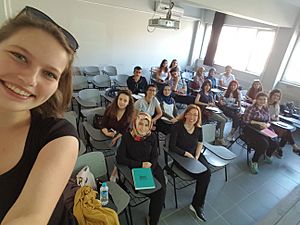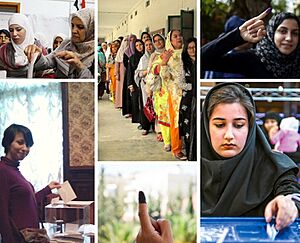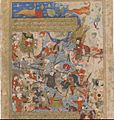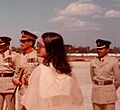Women and Islam facts for kids
The relationship between women and Islam is a big topic. It's looked at in Islamic holy books and also through the history and cultures of Muslim countries. Many Islamic scholars say that the Qur'an, which is the holy book of Islam, teaches that women and men are equal in their faith and moral standing.
However, sharia (which is Islamic law) shows some clear differences between what women and men are expected to do, their rights, and their duties. In many countries where most people are Muslim, women have different rights than men when it comes to things like marriage, divorce, civil rights, their legal standing, how they dress, and their education.
Islamic feminism is a type of feminism that focuses on women's rights and roles within Islam. Nawal El Saadawi was an Egyptian feminist who wrote many books about women in Islam.
Contents
Women in Islam
The role of women in Islam is a topic with many different views. Some people believe that Islamic teachings give women a very special and equal place. Others point to how laws and customs in some Muslim countries treat women differently from men.
What the Qur'an Says
The Qur'an is the central religious text of Islam. It is believed to be a message from God. Many Islamic scholars believe the Qur'an teaches that men and women are equal in their spiritual value. Both are seen as having the same duties to God and will be judged equally.
Laws and Rights
Islamic law, called sharia, is based on the Qur'an and the teachings of the Prophet Muhammad. Sharia covers many parts of life, including family matters. In some Muslim countries, sharia is used to create laws that affect women's rights in areas like:
- Marriage: Rules about who can marry whom and how marriages are arranged.
- Divorce: How a marriage can end and the rights of both partners.
- Legal Status: How women are treated in courts and by the law.
- Dress Code: Rules about how women should dress in public.
- Education: Access to schooling and learning opportunities.
These laws can be very different from one country to another. Some countries have laws that give women more rights, while others have more restrictions.
Women in Education
Education is very important in Islam. The Qur'an encourages both men and women to seek knowledge. In many Muslim countries, women are getting more and more educated. For example, in Turkey, nearly half of the staff at top universities are women. In Indonesia, many women hold senior business jobs.
Women in Leadership and Public Life
Throughout history, Muslim women have played important roles in society. Some have been leaders, scholars, and businesswomen. Today, many Muslim women are active in politics, science, and sports.
For example, Khaleda Zia and Sheikh Hasina have both served as Prime Minister of Bangladesh. This is unique because two women have led the country for a long time. Anousheh Ansari was the first Muslim woman to travel to space. Muslim women also compete and win medals in international sports like Taekwondo.

Different Views on Women's Roles
There are many different ideas about what women's roles should be in Islam.
- Traditional Views: Some people believe women should mostly focus on their families and homes. They might think women should not be involved in politics or public life.
- Modern Views: Others believe that Islam supports women's full participation in all parts of society. They argue for equal rights and opportunities for women.
- Islamic Feminism: This movement tries to find ways to support women's rights and equality using Islamic teachings. They believe that true Islamic principles promote justice and fairness for everyone.
Images for kids
-
Pakistani school girls in Khyber Pakhtunkhwa.
-
Three female Garuda Indonesia employees at a tourism fair.
-
A Kazakh wedding ceremony in a mosque.
-
Women in an Istanbul cafeteria.
-
Two Malaysian women wearing different styles of clothing: a modern hijab (left) and a traditional kebaya blouse.
-
Khaleda Zia as Bangladesh's first lady (1977–1981).
-
Taekwondo medallists from different countries at the 2016 Summer Olympics, including two women wearing hijabs.
-
Mehriban Aliyeva, the First Lady of Azerbaijan, at a medal ceremony during the 4th Islamic Solidarity Games.
See also
 In Spanish: La mujer en el islam para niños
In Spanish: La mujer en el islam para niños
 | Jessica Watkins |
 | Robert Henry Lawrence Jr. |
 | Mae Jemison |
 | Sian Proctor |
 | Guion Bluford |

















